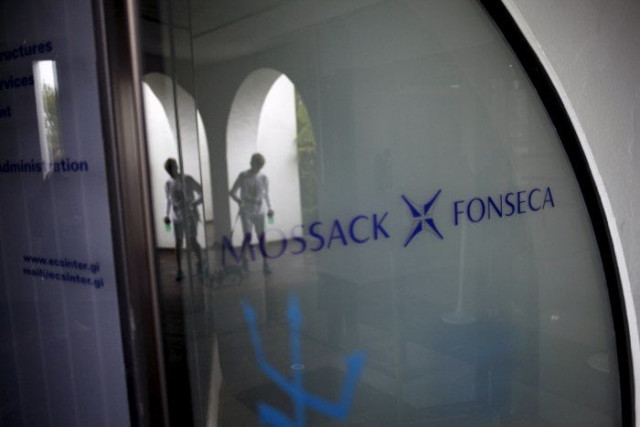Panama Papers: Mossack Fonseca struggled to identify 75% of clients
New leaks show the law firm had no idea who was benefiting from its services

Mossack Fonseca law firm sign is pictured at the Neptune House building in the British colony of Gibraltar, April 4, 2016. PHOTO: REUTERS
The follow up by International Consortium of Investigative Journalists (ICIJ) published on Thursday revealed the chaos at the Panamanian law firm as employees were given a new task: find out who the firms’ client are.
The firm did not know the identity of around 75 percent of its clients.
“The firm could not identify tens of thousands of owners of companies it had registered in opaque, low-tax jurisdictions.”
Aftermath
Two months after the leak, the firm was unable to identify owners of more than 70 percent of 28, 500 active companies in the British Virgin Islands. “It didn’t know who owned 75 percent of 10,500 active shell companies in Panama, the records show.”
“As a key player in the world of offshore finance, Mossack Fonseca had for years flouted rules requiring lawyers and other offshore specialists to identify and verify their clients, requirements designed to prevent aiding criminal activity.”
After the Panama leaks, “Mossack Fonseca employees frantically emailed bankers, accountants and lawyers – the professionals who had hired the firm to set up shell companies for wealthy clients who wanted to remain anonymous – in an attempt to close the gaps in its recordkeeping. Those intermediaries responded with panic and fury.”
ICIJ reports that the firm's failure to comply with know-your-client rules could expose it to lawsuits and criminal investigations – leading to shutting down of shell companies thereby “throwing its own and clients’ businesses into chaos.”
Experts also told ICIJ that the aftermath saw stricter know-your-client standards as governments stepped up efforts to combat money laundering and terror funding. “Mossack Fonseca’s brazen disregard of such a fundamental legal obligation was extraordinary,” experts said.
ICIJ set to release 'Panama Papers 2' tonight
“It shouldn’t be acceptable that a firm like this doesn’t know the owner of one shell company, let alone thousands of them,” said Jack Blum, a US attorney who specializes in tax fraud and money laundering. Having no record of clients and their companies “tells you how far the shell business has gone in terms of being a sham. It strikes me that it’s as crazy as crazy can be”, he added.
On the other hand, Mossack Fonseca’s lawyer, Guillermina McDonald told ICIJ partners that the law firm defined its ‘clients’ as “lawyers, bankers and accountants and not end-users.” She said the law firm ‘always’ knew what it was required to know about company owners.
To its clients, the law firm said it had installed a firewall to rebuff computer attacks and “introduced a system to encrypt emails and documents about the most sensitive part of the offshore industry – who owns what.”
According to ICIJ, the firm hired “media relations consultants to give our version of the events. It also contacted what it called industry ambassadors to ask them for public support.”
The clients, the documents show, were not reassured. “One lawyer grew impatient listening to telephone hold music and complained in a July 2016 email to Josette Roquebert, a senior Mossack Fonseca director in Panama. Another grew increasingly frustrated as days passed without a response to an email.”
“By a lot of messages, you, MOSSACK, are trying to convince we clients that you are taking control of this unbelievable situation,” wrote Félix Chille, a Swiss intermediary. “This email will, probably, be intercepted like 11,600,000 other documents. I don’t care.”
Investigations
On the legal front, the law firm also faced investigations from governments. The Seychelles Financial Services Authority asked the firm to reveal owners of some 5, 379 active companies incorporated in the island archipelago. However, internal emails showed “employees acknowledging to each other that they might not be able to comply with the requests – and discussing the potential risk of losing the right to operate in the country.”
The only political casualties of Panama Papers: Iceland's PM, Spanish minister and Nawaz
The new leaks further revealed that an “audit by Seychelles’ financial crime agency months later concluded that Mossack Fonseca’s office did not regularly monitor high-risk, politically-connected clients and had violated six anti-money-laundering laws and regulations.”
Coping with the leaks
Initially, Mossack Fonseca encouraged its clients to remain loyal. It slashed fee, offered options to change shell company’s names to allow them to operate in discretion. The law firm helped “some clients by changing its own business name to remove any obvious reference to the Panamanian founders on mail, packages and invoices.”
“In Samoa, Mossack Fonseca became Central Corporate Services Ltd. In Panama, Mossack Fonseca transferred clients to Orbis Legal Services, which hired some Mossack Fonseca employees to maintain the same level of service,”
Some clients, however, “simply moved their business to other offshore service providers in havens such as Guernsey in the Channel Islands, the British Virgin Islands and Cyprus,” according to the ICIJ.



















COMMENTS
Comments are moderated and generally will be posted if they are on-topic and not abusive.
For more information, please see our Comments FAQ